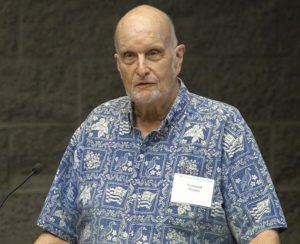
The prominent sociologist Armand Mauss passed away on August 1, 2020. We remember him fondly. He was an inspiration and guide for the establishment of the Howard W. Hunter Chair in Mormon Studies.
Armand served as a founding member of the Mormon Studies Council at CGU and taught in CGU’s Mormon Studies program. Below are tributes from colleagues, friends, and students.
——–
Howard W. Hunter Chair in Mormon Studies, Claremont Graduate University
After I finished my graduate training I got to know Armand personally, and discovered that his rigor, generosity, and imagination characterized him as a mentor, friend, and guide. When I took the Hunter Chair, Armand became one of those figures I consulted with regularly for counsel and encouragement. He will be missed.
R. Randall Huff
Past Chairman of the Mormon Studies Council and the Howard W. Hunter Foundation
Jana Riess
Author of The Next Mormons
Christie Frandsen and Amanda Haslam Wirtz
Chairs, Mormon Studies Council
Patrick Mason
Leonard J. Arrington Chair of Mormon Culture, Utah State University
Howard W. Hunter Chair of Mormon Studies, Claremont Graduate University, 2011-2019
Having retired to Orange County, he was in the right place at the right time when Claremont Graduate University began considering the possibility of creating an endowed professorship in Mormon studies.
Those who care both about Mormonism and the life of the mind stand on the shoulders of a generation of giants (some of whom, fortunately, are still with us). In Armand Mauss’s passing, we lose one of these giants, one whose exterior was stern and exacting but whose heart more than filled his large frame. Those of us who knew Armand personally will never forget him, and all of us are in his debt. How will we repay the debt? I think I know what Armand would say: read, think, write, and live honestly. After all, what good is any other way?
Michael McBride
Professor of Economics & Religious Studies, University of California, Irvine
Claudia Bushman
Professor Emerita of American Studies, Columbia University
Richard Bushman
Professor Emeritus, Columbia University
Inaugural Holder of the Howard W. Hunter Chair of Mormon Studies
Joseph Bentley
Chair of the CGU Mormon Studies Council, 2005-2010
I think he was the first ever to teach any courses in Mormon Studies at CGU. He started as an adjunct professor soon after I brought him onto the MS Council in 2004 and he taught for the next four years until the Bushmans arrived in 2008. His credibility with other faculty members enabled his appointment as a most effective member of the search committee, where he guided the selection of Richard Bushman as a senior professor. He was instrumental in creating the highly active Claremont Mormon Studies Student Association, then continued as our liaison with it and with the School of Religion for about a decade.
In his own humble but scholarly way, Armand was faithful and true and loyal to God, to gospel principles and to sound academics. In short, he was our “man for all seasons,” and “for all reasons,” at CGU. I loved the man and always will. I shall miss him, as will all who served with him until he retired from that service to care for his beloved wife Ruth. My desire is to be reunited with both of them in a higher realm some day!
Rick Richmond
Chairman of the Howard W. Hunter Foundation
John Dalton
First Chairman of the Howard W. Hunter Foundation